 Founded in April 2007, Kyoto University’s Kokoro Research Center is a unique research organization that promotes academic research on “kokoro” that can contribute to society. The researchers at our center are experts in areas ranging from neuro and cognitive science to Buddhist studies, from cultural and social psychology to clinical psychology, from Esthetics to public policy. Since its foundation, the center has grown in size and scale; various projects have been conducted, collaborative MRI research facilities have been established, and it has evolved into an organization that integrates Science and the Humanities. Under Professor Sakiko Yoshikawa (the first director of the center), it celebrated its 10th anniversary at a symposium held on July 28th, 2017.
Founded in April 2007, Kyoto University’s Kokoro Research Center is a unique research organization that promotes academic research on “kokoro” that can contribute to society. The researchers at our center are experts in areas ranging from neuro and cognitive science to Buddhist studies, from cultural and social psychology to clinical psychology, from Esthetics to public policy. Since its foundation, the center has grown in size and scale; various projects have been conducted, collaborative MRI research facilities have been established, and it has evolved into an organization that integrates Science and the Humanities. Under Professor Sakiko Yoshikawa (the first director of the center), it celebrated its 10th anniversary at a symposium held on July 28th, 2017.
The center’s name in Japanese is the “Kokoro no Mirai Kenkyu Center”. The word “kokoro” is not easily translated into English. Kokoro can mean internal human qualities, such as the mind, spirit, or soul, but the concept can also be extended to objects and to nature. Its connection to aesthetics, art and entertainment also shows the uniqueness of the concept of kokoro. Our researchers are mindful of the expansiveness and nuances of kokoro when conducting research. The word “mirai” in the center’s Japanese name means “future”, so the center’s name indicates how we are oriented towards an understanding of “the future of kokoro”. In other words, our center not only studies various aspects of kokoro, but also we explore and provide ideas of how kokoro will be manifested and embodied in future societies.
Modern advances in science, technology and the global economy have been invaluable. However, they have also created threats to the natural environment and exacerbated economic inequality and given rise to reactionary fundamentalism. When times change, kokoro also changes. In transitional times, negative symptoms in individuals such as adaptation disorder and depression can emerge first. It is surely important to provide individual care and support for suffering persons. But it is crucial to understand direction of change that kokoro may take and to have a vision of what it would mean to have a wealth of kokoro rather than materialistic convenience and wealth.
To answer these questions, the center conducts a wide array of research on kokoro using various methods. Some research uses experiments to understand brain functioning and cognition. Other research investigates human behaviors and social relations. Psychotherapeutic techniques may be used in clinical settings. Analysis of literature is an instrument in the field of Buddhist studies. The Center features three major research areas. “Kokoro and the Body” investigates kokoro via the brain and body. “Kokoro and Kizuna” (interpersonal bonds) investigates kokoro via relationships and society (e.g., emotion, communication, and interaction). “Kokoro and Life” investigates kokoro via worldviews (e.g., consciousness, values, and life). Many of our areas of expertise address all of these categories and all three keywords are relevant to them.
Currently, research on kokoro is conducted extensively in various academic fields. However, the tendency towards specialization and subdivision can result in losing sight of a bigger picture. Thus, our center engages in top level research in various disciplines to more fully explore kokoro and to pursue a more holistic vision of kokoro of the future. Our goal is to continue building a network for domestic and international research organizations, and to function as a creative academic space by promoting mutual exchange. Additionally, it is our hope to actively let the community know what we do by communicating our research results to public via our website and academic information magazine, and to continue to conduct open symposia, workshops, and seminars. Your warm support for the Kokoro Research Center will be greatly appreciated.
Director, Kyoto University’s Kokoro Research Center
Professor Toshio Kawai